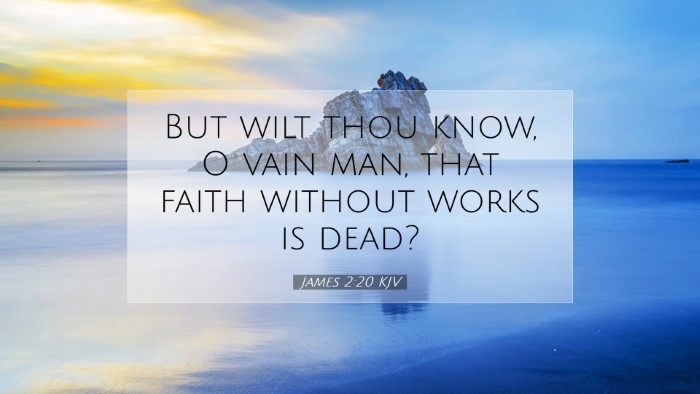Old Testament
Genesis Exodus Leviticus Numbers Deuteronomy Joshua Judges Ruth 1 Samuel 2 Samuel 1 Kings 2 Kings 1 Chronicles 2 Chronicles Ezra Nehemiah Esther Job Psalms Proverbs Ecclesiastes Song of Solomon Isaiah Jeremiah Lamentations Ezekiel Daniel Hosea Joel Amos Obadiah Jonah Micah Nahum Habakkuk Zephaniah Haggai Zechariah MalachiJames 2:20
James 2:20 KJV
But wilt thou know, O vain man, that faith without works is dead?
James 2:20 Bible Commentary
Bible Commentary on James 2:20
Verse Text: “But wilt thou know, O vain man, that faith without works is dead?”
1. Introduction
James 2:20 presents a critical examination of faith and works, proposing that genuine faith invariably produces action. This verse serves as a central tenet of James' epistle, challenging superficial understandings of faith.
2. Contextual Background
The book of James is often regarded as the most practical epistle in the New Testament. It addresses early Christian communities facing trials and temptations, emphasizing ethical living and practical faith. This verse falls within a broader argument regarding the relationship between faith and works, which James articulates with clarity and conviction.
3. Exegesis of James 2:20
The apostle James addresses the "vain man," highlighting his foolishness in believing that mere faith, devoid of accompanying actions, holds any value. The term "vain" suggests emptiness—pointing to an illusion of faith without the requisite evidence of works.
- “Wilt thou know”: This phrase invites the listener to engage in thoughtful reflection, suggesting that understanding the nature of true faith requires introspection.
- “O vain man”: This characterization reflects the misguided belief that intellectual acknowledgment of faith suffices apart from transformative action.
- “Faith without works”: James paints a clear dichotomy here, emphasizing that faith devoid of works is lifeless, incapable of producing spiritual fruit.
- “Is dead”: The term “dead” connotes not just inactivity but a complete lack of vitality, suggesting that such faith is ineffectual for salvation or spiritual growth.
4. Commentary Insights
4.1 Insights from Matthew Henry
Matthew Henry notes that true faith naturally results in good works, which serve as evidence of spiritual life. He stresses that a mere profession of faith, akin to a lifeless body, cannot save. Henry suggests that genuine believers will not remain inert but will demonstrate their faith through deeds that align with God's commands.
4.2 Insights from Albert Barnes
Albert Barnes emphasizes the futility of faith that does not inspire moral action. He argues that faith must be productive, serving as a foundation for good works. Barnes highlights the necessity of works as a manifestation of faith, aligning with the biblical principle that every tree is known by its fruit, which validates the reality of one's faith.
4.3 Insights from Adam Clarke
Adam Clarke elaborates on the concept that faith and works cooperate in the life of a believer. He challenges the notion of idle faith by underscoring that one's actions originate from their beliefs. Clarke asserts that faith should propel a believer to act in accordance with God's will, thereby asserting the integrity of their faith through tangible outcomes.
5. Theological Implications
This verse raises critical theological inquiries regarding salvation and the nature of faith. The relationship between faith and works is often debated within Christian circles, particularly concerning the doctrines of justification and sanctification.
- Grace and Works: It is paramount to understand that while salvation is by grace through faith (Ephesians 2:8-9), true faith manifests itself in obedience and good works (Ephesians 2:10).
- Evidence of Faith: Works serve as evidence of an active faith; they are the outward expression of an inward reality. This reflects the transformative power of the Gospel in the life of a believer.
- Role of the Believer: Believers are tasked with living out their faith, demonstrating their allegiance to Christ through tangible acts of love and service.
6. Practical Application
For pastors, students, and theologians, James 2:20 provides several practical lessons:
- Self-Examination: Regularly assess one's own faith—what actions do they inspire? Are believers reflecting the character of Christ in their actions?
- Teaching on Faith: Emphasize to congregations the harmony of faith and works, warning against complacency and the false security of a faith that lacks demonstration in life.
- Encouraging Community Action: Mobilize church members to engage in acts of service, illustrating the belief that such works are a natural outflow of faith.
7. Conclusion
James 2:20 serves as a clarion call for authenticity in the Christian faith. The combined insights from Matthew Henry, Albert Barnes, and Adam Clarke underscore the imperative that faith must be coupled with works to be alive and effective. For those entrusted with teaching and shepherding, this verse offers both a challenge and a profound opportunity to encourage believers towards greater integrity and vibrant faith in action.


